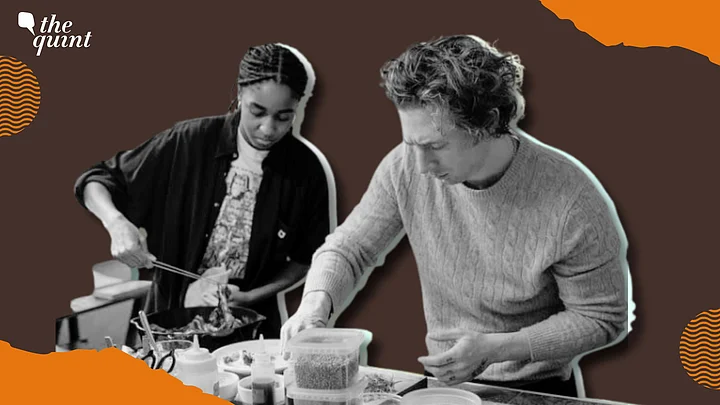(The story contains spoilers)
Food and language have a long-standing connection. The way we communicate through food cuts across cultures, gender and geography. Christopher Storer's Golden Globe-winner show The Bear does just that - it responds to the multi-sensory nature of food acting as a language for love, grief and memory.
Christine Jourdan writes, “These are two different ways of doing food and language: the first one mingles food with speech, the second one with silence.” It is precisely this silence that pervades the series, as the protagonist, Carmy (Jeremy Allen White), an up-and-coming chef, willingly chooses to run his family-owned restaurant after his brother Michael (Jon Bernthal), the previous owner, suddenly dies.
The first season navigates the trauma of grief. Not much is said, but Carmy’s insistence to turn his deceased brother's sandwich shop into a success underlies the bond they shared over food. In the second season by opening the new restaurant ‘The Bear,’ Carmy keeps his brother’s legacy alive.
Grieving, anxiety and the language of food
It’s the semantics of food that keeps the frenetic kitchen drama unbelievably nuanced. In one of the episodes, artfully plated pictures of dishes aid Carmy as his anxiety-induced mind spirals. The shots are in quick succession and intercepted by close-ups of his visibly tensed and then gradually relaxing face. Food becomes a medium to processing episodes of turbulence.
Unease is weaved into the tonality of the show – starting from the family dynamics to the mayhem of a disorderly and later an orderly kitchen. Cooking is at the centre of the frenzy – the passion that most of the characters embody spills into all that they create.
Marcus (Lionel Boyce), the in-house dessert chef, reclaims Carmy’s family cannoli recipe by fashioning a savoury dessert – parmesan shell stuffed with mortadella and cream, garnished with caviar – he calls it ‘The Michael.’ So, despite the disconcerting family equations, it's the food that manages to pay homage to the love the family shared after Mikey's death.
Feeding as a language of care
In the penultimate episode of the second season, Sydney (Ayo Edebiri), who was promoted from being the sous-chef to the head chef, whips up a French omelette with Boursin cheese, sprinkled with chives and potato chips on top for Nat, Carmy’s overworked sister. The chef calls it the “best part of my day” – the scene inherently reveals the most fundamental function of food – nourishment and care. Carmy’s response is apt – “You love taking care of people.”
Preserving rituals through the language of food
The Bear also has a fascinating way of highlighting how rituals are kept alive. Sidney W. Mintz, who pioneered the modern anthropology of food, contends, “holidays often preserve what the everyday loses.” In the Christmas episode of the second season, Carmy’s alcoholic mother (Jamie Lee Curtis) attempts to cook the traditional Italian Feast of the Seven Fishes. The kitchen is a mess, the family members are rowdy albeit well-intentioned, building a premise for Carmy's turbulent yet eventful past.
The episode is a roadmap to ‘preserving’ familial bonds, one’s heritage and love. But it struggles when the grammar of love is merely a ticking time bomb ready to set off at the slightest misstep, represented through their mother. This time around, the practice of preserving food traditions is shrouded in hysteria – managing to do very little. The camera focuses on the unruly nature of its cook, Carmy's mom, which is in sharp contrast to her son's meticulous style of cooking.
Communicating the 'unsaid' through cooking
In the episode ‘Pop’ the gear shifts, the methods of cooking embrace concepts of sustainability. Sydney is consciously creating a menu for the high-end restaurant with precision and care. But her experimentation itself borderlines maximalism. It underlines Sydney’s own struggles with her palette while trying to keep the food inspired – ultimately attempting to say a lot without 'saying' anything with the trial and error of her inventive cooking style.
But it’s really Mikey’s letter to Carmy at the end of season one that cements the language of food, hiding the possibility of a new beginning. Mikey's last letter to Carmy contained a spaghetti recipe which instructs Carmy to use a specific kind of canned tomatoes. Upon opening one of the cans wads of cash wrapped in saran is found hidden inside it. The rest of the staff jubilantly start opening the cans and the rest is history.
In the Christmas episode, Mikey and Carmy fail to have a proper talk. It shows us a glimpse into Carmy’s own fish-out-of-water situation in his family home. Mikey’s laconic nature throws light on how food would always be their ‘common ground.’ The older brother manages to succinctly write all that was needed to be said through a recipe before his tragic death.
The Bear is about a volatile family – sensitive but aggressive. Carmy stands apart from the rest. It's their lack of verbal communication that proceeds to find a language in what they do best. And while they all struggle with their demons they find refuge in the practice of cooking, especially when words fail them.
The series is available to watch on Disney + Hotstar.
